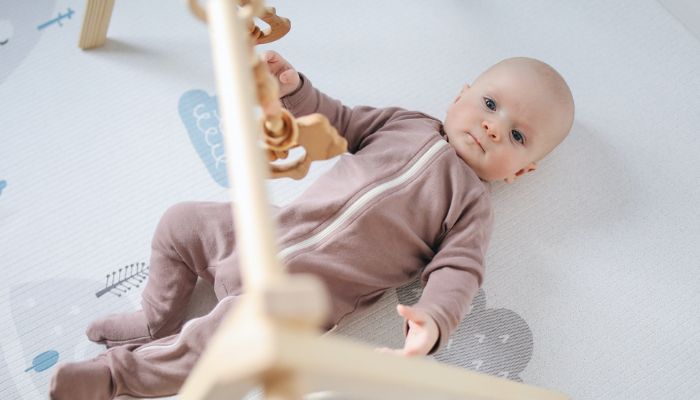Best Bedtime Routines for Toddlers & Newborns: The Unabashed Guide

There’s no right or wrong answer when it comes to finding the best bedtime routine for your toddler or baby – what works for one family might not work for another.
However, a few tried and tested tips can help make bedtime a calm and relaxing experience for everyone involved.
Here are our top tips for creating a good bedtime routine for newborns and toddlers!
Bedtime Routines for Toddlers

How do you establish bedtime routines for toddlers? What type of bedtime routine works best for your child? How do you handle bedtime when your toddler doesn’t go to bed?
These are all common questions parents face when establishing a bedtime routine for their toddlers.
Establishing a bedtime routine can be tricky, but it’s worth the effort! This section will discuss some tips for establishing healthy and effective toddler bedtime routines.
Let’s get started!
Establish a bedtime routine and stick to it
The key to establishing a successful bedtime routine is consistency. Be sure to stick to the same schedule every night, so your toddler knows what to expect.
If something arises and you need to change the routine, try to be as flexible as possible and explain the change to your child.
One of the most important aspects of a bedtime routine is giving your child enough time to wind down before bed.
This means avoiding screens and keeping activities calm and relaxing.
A good way to do this is by reading your child a story or singing them a song. These calming activities help prepare their mind and body for sleep.
It’s also important to have a regular bedtime for your toddler. This will help their body get into a rhythm and make it easier for them to fall asleep.
Choose a time that works for your family and stick to it as much as possible.
1. Start with a bath – make sure the water is not too hot or cold
One of the best ways to get your toddler ready for bed is by starting with a bath. Ensure the water is not too hot or cold, and use a gentle soap that won’t irritate their skin.
Dry them off, put on their pajamas, and then brush their teeth and hair. Reading them a story or singing them a song can help them relax before bed.
2. Use a gentle soap that won’t irritate your child’s skin
When choosing a soap for your child’s bath, it’s important to choose one that won’t irritate their skin.
Some soaps can be harsh and cause irritation, so it’s best to go with a gentler option.
Many types of gentle soap are available, so you can find one your child will like. Look for soap free of dyes and fragrances, as these can also irritate.
3. Dry them off and put on their pajamas
Once your toddler is out of the bath, dry them off properly and get them into their pajamas. Choosing a breathable fabric that won’t irritate their skin is best.
Avoid overdressing your child, as this can make it harder for them to get a good night’s sleep.
If the weather is cold, a light layer of clothing or a blanket may be enough to keep them warm and comfortable.
4. Brush their teeth and hair
Before bed, it’s important to brush your toddler’s teeth and hair. This will help prevent bacteria from building up in their mouth and scalp overnight, keeping them healthy.
Use an age-appropriate toothbrush and toothpaste, and make sure to brush gently. You can also use a gentle shampoo or conditioner on their hair if necessary.
5. Read them a story or sing them a song
Reading a story or singing a song can be an incredibly calming activity before bed. Choose something that your toddler loves, such as an old nursery rhyme.
This helps them relax and allows you to bond with your child before bed.
Bedtime Routine for Newborns

Most babies thrive on a bedtime routine. It helps them to relax and prepare for sleep. A bedtime routine can also help your baby sleep through the night.
You can do many different things to create a bedtime routine, but it’s important to find what works best for your baby and stick to it.
Here are some tips on how to establish a bedtime routine for newborns.
1. Choose a bedtime story
When creating a bedtime routine for your newborn, choosing a bedtime story is a great way to help them relax and prepare for sleep.
Reading your baby a story at bedtime can also help them develop literacy skills. Many children’s books are perfect for bedtime, and you can make up your own stories.
Be sure to choose a calming, relaxing story, and avoid stories that are too exciting or stimulating.
Our bedtime story recommendation: Good Night Moon by Margaret Wise Brown
2. Dim the lights and relax your baby
When you are ready to put your baby to bed, dim the lights in their room and create a calm atmosphere. Soft music or white noise can also help to relax your baby.
Once the environment is calming, try putting your baby into their crib when swaddled and close to sleep. This will teach them to soothe themselves to sleep without your assistance.
3. Respond to your baby’s cries during the night
During the night, responding to your baby’s cries is important so that they know you are there for them.
However, avoid picking up your baby every time they cry, as this may create a habit of frequent nighttime awakenings.
Responding to their cries calmly and soothingly will help your baby to feel safe and secure, allowing them to settle back down.
4. Stay consistent with your bedtime routine
Finally, it is important to stay consistent with your bedtime routine. Babies respond well to predictability, so try to stick as closely as possible to the same routine each night.
This will help your baby learn when it’s time for sleep, making it easier for them to settle down and sleep through the night.
Frequently Asked Questions (FAQs)
What time should 3-year-olds go to bed?
It is generally recommended that 3-year-olds go to bed between 7 and 8 pm. This gives them enough time to wind down from the day and get a full night’s sleep.
Is 7 pm a good bedtime for a 2-year-old?
7 PM may be a good bedtime for some two-year-olds, but not all. It depends on the child’s natural sleep patterns and how they sleep during the day.
If a child is used to napping during the day, they may not be ready for bed at 7 PM. However, if a child has been sleeping through the night and taking only one nap during the day, 7 PM may be a good time for them to go to bed.
Some 2-year-olds can stay up later than 7 PM, but this is usually because they took an early nap during the day.
How long should bedtime take for a toddler?
The answer may vary depending on the child, but most experts agree that bedtime should last between 30 and 60 minutes. This allows enough time for the child to wind down from the day’s activities and prepare for sleep.
Of course, parents should also factor in time for reading stories or singing songs. A short bedtime routine can help to soothe a restless child and promote a good night’s sleep.
Toddler missed nap… early bedtime?
If your toddler misses their nap during the day, it’s usually best to put them to bed a little earlier than usual. This will ensure they get the rest they need and don’t become overtired.
However, if your toddler seems full of energy and has difficulty settling down for the night, you may want to try letting them stay up a bit later. Sometimes, toddlers need some extra time to wind down before falling asleep.
What if my toddler is stalling at bedtime?
First, establish a bedtime routine and stick to it as much as possible. This will help your child know when to start winding down for the night.
You can also try using a calm and gentle voice when it is time for bed and giving them some time to relax in their room before turning out the light.
If stalling continues to be a problem, you may want to limit the hours your child is awake in the evening and ensure they get enough sleep during the day.
Wrapping it Up
Although bedtime can be challenging for parents and children, establishing a routine and following through with it can help make the process smoother. These tips should give you a good place to start when creating your own bedtime routine for your toddler or newborn.
What tricks have you found that work well for getting your little one to sleep?


